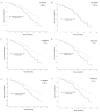Inositol Polyphosphate Multikinase (IPMK), a Gene Coding for a Potential Moonlighting Protein, Contributes to Human Female Longevity
- PMID: 30744060
- PMCID: PMC6410091
- DOI: 10.3390/genes10020125
Inositol Polyphosphate Multikinase (IPMK), a Gene Coding for a Potential Moonlighting Protein, Contributes to Human Female Longevity
Abstract
Biogerontological research highlighted a complex and dynamic connection between aging, health and longevity, partially determined by genetic factors. Multifunctional proteins with moonlighting features, by integrating different cellular activities in the space and time, may explain part of this complexity. Inositol Polyphosphate Multikinase (IPMK) is a potential moonlighting protein performing multiple unrelated functions. Initially identified as a key enzyme for inositol phosphates synthesis, small messengers regulating many aspects of cell physiology, IPMK is now implicated in a number of metabolic pathways affecting the aging process. IPMK regulates basic transcription, telomere homeostasis, nutrient-sensing, metabolism and oxidative stress. Here, we tested the hypothesis that the genetic variability of IPMK may affect human longevity. Single-SNP (single nuclear polymorphism), haplotype-based association tests as well as survival analysis pointed to the relevance of six out of fourteen genotyped SNPs for female longevity. In particular, haplotype analysis refined the association highlighting two SNPs, rs2790234 and rs6481383, as major contributing variants for longevity in women. Our work, the first to investigate the association between variants of IPMK and longevity, supports IPMK as a novel gender-specific genetic determinant of human longevity, playing a role in the complex network of genetic factors involved in human survival.
Keywords: IPMK; SNP; aging; gender-specific association; inositol phosphates; longevity; moonlighting protein; polymorphism; survival.
Conflict of interest statement
The authors declare no conflict of interest.
Figures


References
-
- Kulminski A.M., Culminskaya I., Arbeev K.G., Ukraintseva S.V., Arbeeva L., Yashin A.I. Trade-off in the effect of the APOE gene on the ages at onset of cardiovascular disease and cancer across ages, gender, and human generations. Rejuvenation Res. 2013;16:28–34. doi: 10.1089/rej.2012.1362. - DOI - PMC - PubMed
Publication types
MeSH terms
Substances
Grants and funding
LinkOut - more resources
Full Text Sources

